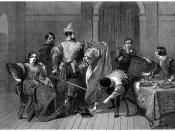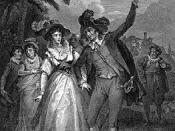The Taming of the Shrew is one of the earliest comedies written by sixteenth and seventeenth century English bard, William Shakespeare. Some scholars believe it may have been his first work written for the stage as well as his first comedy (Shakespearean 310). The earliest record of it being performed on stage is in 1593 or 1594. It is thought by many to be one of Shakespeare's most immature plays (Cyclopedia 1106).
In The Taming of the Shrew, Petruchio was the only suitor willing to court Kate, the more undesirable of Baptista's two daughters. Kate was never described as unattractive (Elizabeth Taylor played her role in one film of the production), but was known for her shrewish behavior around all of Padua. Bianca, on the other hand was very sweet and charming and beautiful; for these reasons many suitors wooed her. Kate was presented to be much more intelligent and witty than Bianca, but, ironically, she could not compete with Bianca because of these witty comebacks and caustic remarks she made (Dash 830).
All of the men who desired Bianca needed somebody to marry Kate, as it was customary for the older daughter to be married before the young one. Finally, Petruchio came along to court Kate, saying he wanted to marry wealthily in Padua. It appeared, though, as if Petruchio was the kind of man who needed an opposition in life. The shrewish Kate, who was known to have a sharp tongue, very adequately filled his need for another powerful character in a relationship (Kahn 419). When Petruchio began to woo Kate, everybody was rather surprised, but Signior Baptista agreed when Petruchio wanted marry her on Saturday of the week he met her. Clearly, he was not opposed because he wanted to hurry and get Kate married...


